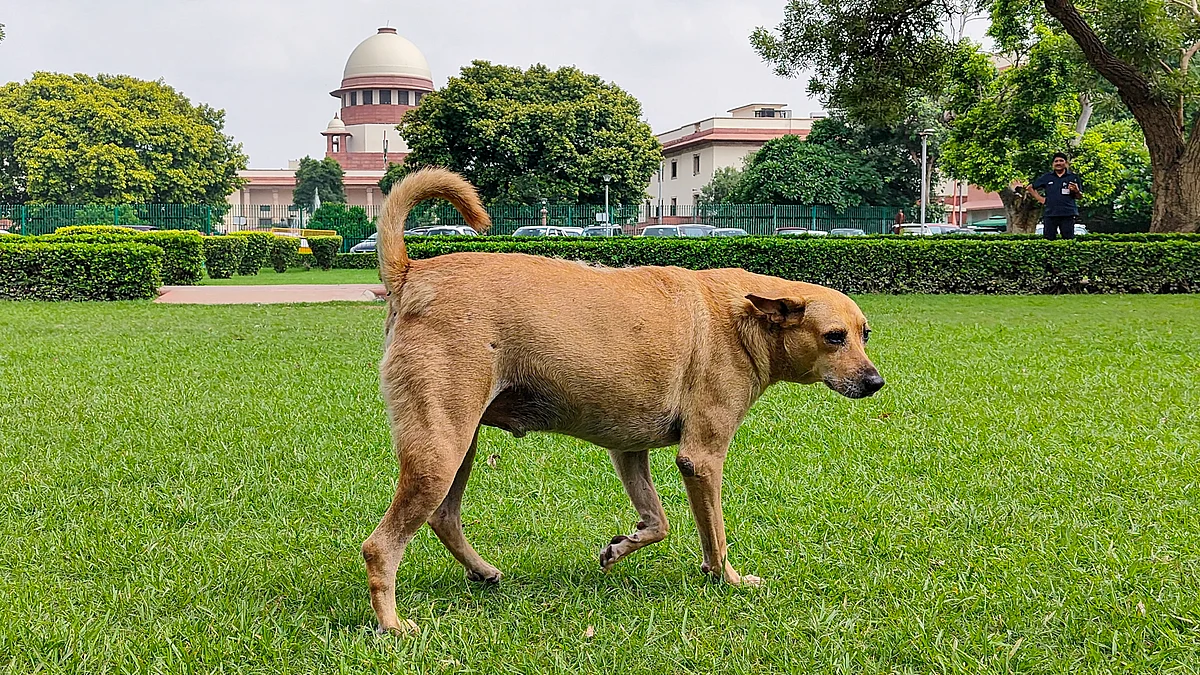Nation
SC orders removal of strays and cattle from public spaces, seeks strict compliance
Sweeping directives were issued to prevent stray dogs from entering educational institutions, hospitals, sports facilities, transport hubs, etc. across India

Citing an “alarming rise in dog-bite incidents”, the Supreme Court on Friday issued a sweeping set of directives to prevent stray dogs from entering educational institutions, hospitals, public sports facilities, transport hubs, and similar premises across the country.
A three-judge bench comprising Justices Vikram Nath, Sandeep Mehta, and NV Anjaria ordered that all such establishments be properly fenced to restrict the entry of stray animals. LiveLaw reported that the local self-government bodies have been tasked with identifying and picking up stray dogs from these areas, vaccinating and sterilising them in line with the Animal Birth Control (ABC) Rules, and relocating them to designated shelters.
Importantly, the Court ruled that these dogs should not be released back into the same locations from which they were removed. “Permitting the same would frustrate the very purpose of liberating such institutions from the presence of stray dogs,” the bench observed.
The bench also directed local authorities to conduct regular inspections to ensure that stray dogs do not re-establish habitats in these areas. Senior advocates Anand Grover and Karuna Nundy urged the Court to reconsider, warning that new dogs could occupy the vacated spaces. However, the bench declined to modify its order.
In addition to addressing the dog menace, the Court extended its directives to include the removal of stray cattle and other animals from highways, expressways, and roads. Upholding earlier directions of the Rajasthan High Court, the bench mandated a coordinated drive to clear such animals and relocate them to goshalas or animal shelters.
“The chief secretaries of all states and Union Territories shall ensure strict compliance. Officers failing to do so will be held personally accountable,” the Court cautioned, directing that a status report detailing the mechanism for compliance be filed within eight weeks.
The order comes as part of an ongoing suo motu case the Supreme Court has been hearing since July, when a bench led by Justices JB Pardiwala and R Mahadevan took cognisance of a Times of India report titled “In a city hounded by strays, kids pay price.” The bench had earlier directed the Delhi government to relocate stray dogs to shelters and prohibit their release, a direction later extended to Noida, Gurugram, and Ghaziabad.
It also warned that any individual or organisation obstructing municipal authorities from carrying out these duties would face legal action, allowing the creation of special units to assist with the capture and relocation process.
Published: undefined
However, the matter took a turn in August when several lawyers pointed out that the 11 August directions conflicted with previous Supreme Court orders. The case was then transferred to the bench headed by justice Vikram Nath. On 22 August, that bench stayed the earlier order, observing that the total prohibition on releasing sterilised and vaccinated dogs was “too harsh”.
Citing Rule 11(9) of the ABC Rules, the Court clarified that healthy stray dogs must be released back to their original locations after sterilisation, deworming, and immunisation — except for those infected with rabies, suspected of being infected, or exhibiting aggressive behaviour. It also banned public feeding of stray dogs outside designated feeding zones and extended the applicability of its directions across India.
All state and Union Territory chief secretaries, along with officials from local bodies and animal husbandry departments, were directed to ensure nationwide compliance and to coordinate on developing a uniform national policy.
On 27 October, the Court summoned chief secretaries of all States and UTs, except West Bengal and Telangana, for failing to file affidavits detailing implementation measures under the ABC Rules. When Solicitor General Tushar Mehta later requested that the officials be allowed to appear virtually, the Court refused, expressing displeasure over the lack of compliance.
Justice Nath’s bench remarked that the Supreme Court was addressing matters that should have been resolved by municipal authorities and state governments, and criticised the officials for showing “a lack of respect” towards the Court’s orders.
The matter will next be reviewed following the submission of compliance reports by state and Union Territory administrations.
With agency inputs
Published: undefined
Follow us on: Facebook, Twitter, Google News, Instagram
Join our official telegram channel (@nationalherald) and stay updated with the latest headlines
Published: undefined